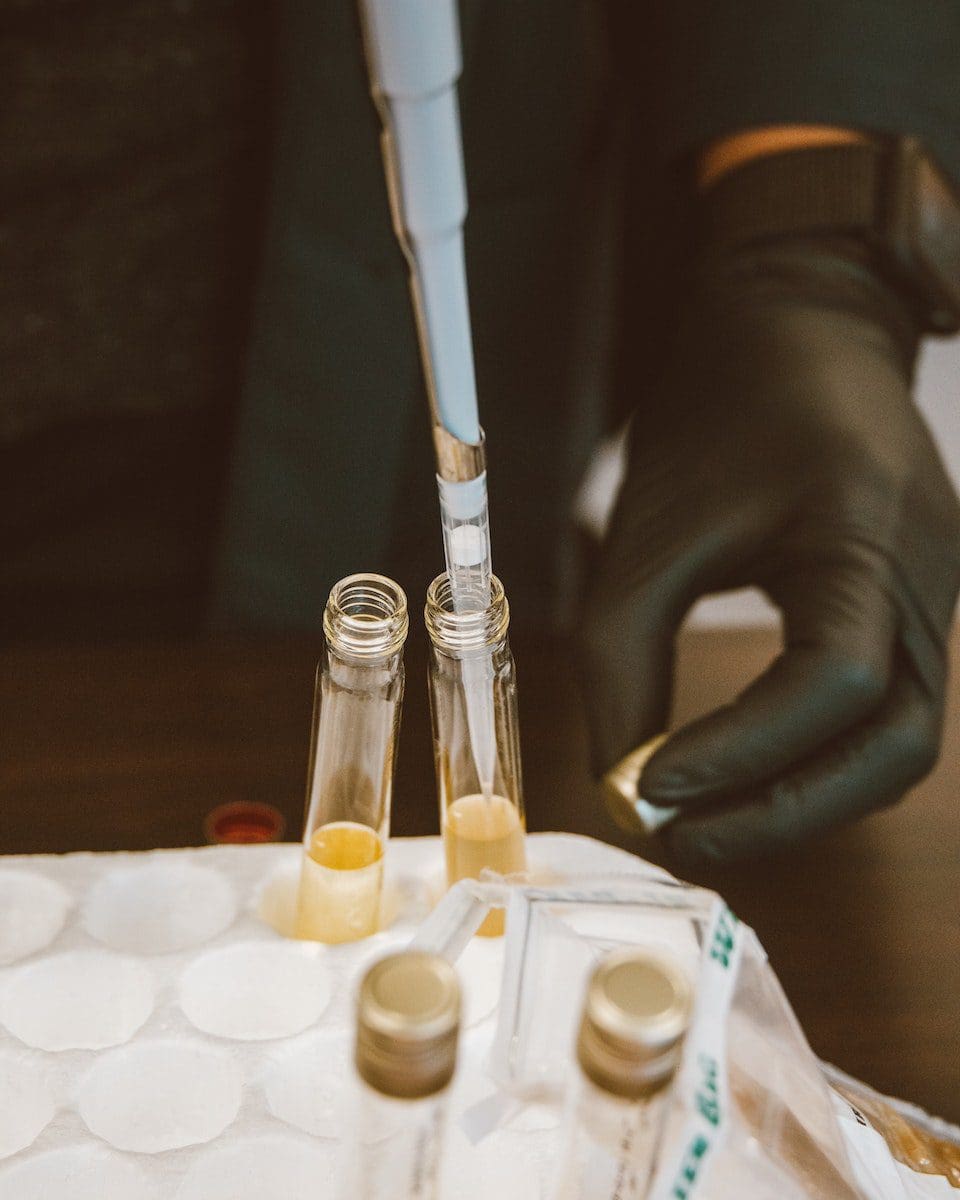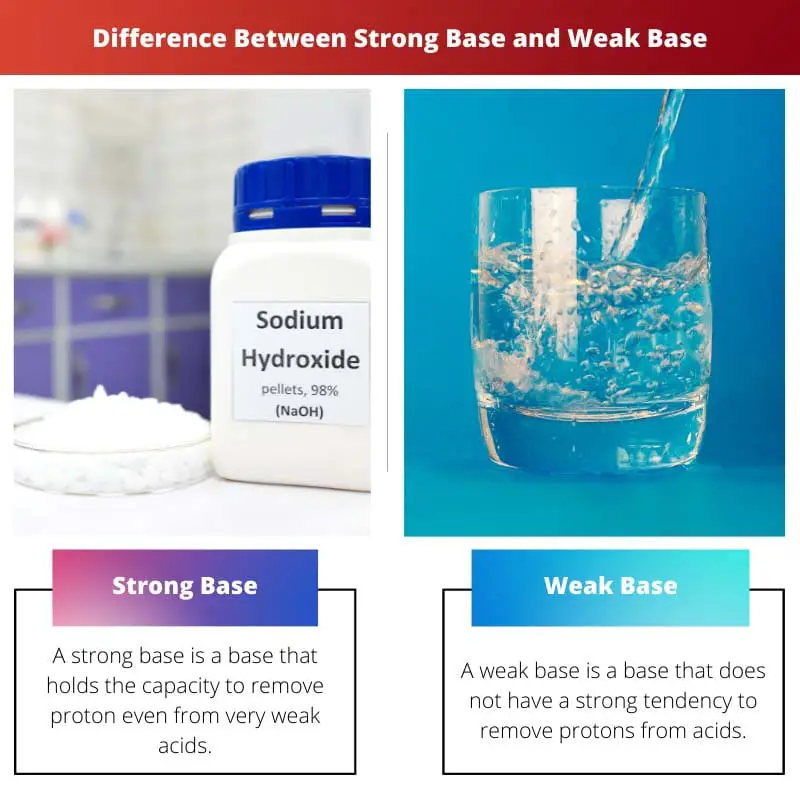A base is a substance that reacts with acids to give salt and water. As proposed by Arrhenius in 1884, the base is a chemical compound that breaks to give hydroxide ions in an aqueous solution.
Another definition of base is that base is a substance that accepts protons and gives away elections. During an acid-base reaction, the base’s hydroxide ion combines with the acid’s hydrogen ion, forming an ionic bond to give salt and water as products; that is, bases tend to accept hydrogen ions.
Bases are classified as Strong base, Neutral base and Weak base, depending on their tendency to dissociate into ions. The strong base can dissociate hydrogen ions or protons from a weak acid.
The weak base is the one that has a lesser tendency to withdraw hydrogen ions or protons from acid during a reaction.
Key Takeaways
- Strong bases dissociate completely in water, releasing a high concentration of hydroxide ions (OH-), whereas weak bases only partially dissociate.
- Examples of strong bases include sodium hydroxide (NaOH) and potassium hydroxide (KOH); weak bases include ammonia (NH3) and methylamine (CH3NH2).
- The strength of a base is indicated by its pH value, with strong bases having a pH close to 14 and weak bases having a pH between 7 and 14.
Strong Base vs Weak Base
A strong base is a base that completely dissociates into its constituent ions when dissolved in water. It releases a high concentration of hydroxide ions in solution, resulting in a high pH. A weak base is a base that only partially dissociates into its constituent ions when dissolved in water.

Comparison Table
| Parameter of Comparison | Strong base | Weak base |
|---|---|---|
| Ionization | Complete ionization. | Incomplete ionization. |
| pH value | 10 to 14. | 7.3 to 10. |
| Reactivity | Strong bases are highly reactive. | Weak bases are less reactive. |
| pKb value | High pKb value. | Low pKb value. |
| Electricity conduction | Strong bases are good conductors of electricity. | Weak bases are poor conductors of electricity. |
What is Strong Base?
A strong base is a base that can remove protons even from very weak acids, or a strong base ionizes completely in an aqueous solution or water. They withdraw hydrogen ions from acids during an acid-base reaction.
Strong bases have a 100% dissociation ability. On the pH scale, strong bases measure from 10 to 14.
They have a high equilibrium constant.
Strong bases have a high pKb value and a ka value greater than 1. It has a negative PKA value.
Generally, strong bases are highly soluble in water and other solutions. The firm bases are highly reactive, therefore, react violently with acids in an acid-base reaction.
They are also good electrolytes. Strong bases are good conductors of electricity because the ability to conduct electricity depends on the number of ions present, and bases have a concentration of ions.
Some examples of strong bases are- Sodium hydroxide (NaOH), Potassium hydroxide (KOH), Lithium hydroxide (LiOH), Calcium hydroxide (Ca(OH)2), Rubidium hydroxide (RbOH), Barium hydroxide (Ba(OH)2), Guanidine, etc. Guanidine is an exceptional case because it remains very stable during protonation.

What is Weak Base?
A weak base is a base that does not have a strong tendency to remove protons from acids. They are the bases that do not ionize completely in water or an aqueous solution.
They are incapable of withdrawing hydrogen ions from acids in an acid-base reaction. They dissociate partially in a solution.
The weak base may ionize either 1% or 99% but they are still known as a weak base. On the pH scale, weak bases measure from 7.3 to 10.
They have a low equilibrium constant compared to strong bases; the weaker the base, the lower the equilibrium constant. Weak bases are not good conductors of electricity.
They also have a low pKb value and a ka value of less than 1. Positive pka values characterize them.
They are not highly soluble in water or other solutions. The weak bases are less reactive and therefore react mildly during an acid-base reaction.
They are poor electrolytes and a poor conductor of electricity because they have less concentration of free ions.
Some examples of weak bases are Ammonia (NH3), Pyridine (C5H5N), Alanine, Ethylamine, Dimethylamine, Glycine, Hydrazine, etc. Water itself acts as a weak base.

Main Differences Between Strong Base and Weak Base
- Strong bases ionize completely during a reaction with acid, whereas weak bases show incomplete ionization.
- Strong bases tend to accept protons, while weak bases have a lower tendency to accept protons.
- When measured on a pH scale, strong bases have a pH between 10 and 14, while weak bases have a pH between 7.3 and 10.
- Strong bases are highly reactive, while weak bases are less reactive.
- pKb values of strong bases are high, while weak bases are low.
- Strong bases are good conductors of electricity, while weak bases are poor conductors of electricity.
- The equilibrium constants of strong bases are high, while those of weak bases are low; on the equilibrium scale, the value shifts to its left as the acid gets weak.
- Strong bases are good electrolytes, while weak bases are not.


The article effectively conveys the differences between strong and weak bases, making it beneficial for those learning about this topic.
The clarity of the article’s explanations is commendable.
I appreciate how the article distills complex details into easy-to-understand points.
This article provides a clear explanation of what constitutes a strong and weak base, it’s very helpful.
Definitely, it’s great to finally have a comprehensive understanding of this topic.
The article is well-structured and presents the information in a concise manner. Well done!
Agreed, I appreciate how clearly the differences between strong and weak bases are outlined.
The content effectively communicates the distinctions between strong and weak bases in a manner that’s both enlightening and accessible.
The writer has succeeded in presenting this technical content in a way that’s approachable and easy to interpret.
Thank you for the informative article, I now understand the difference between strong and weak bases.
I agree, this article clarified many doubts I had about bases.
This content is quite enriching and helps consolidate knowledge on strong and weak bases.
Absolutely, the article is an asset for those seeking to comprehend base chemistry.
The examples provided for both strong and weak bases make it easier to understand the concept.
Absolutely, I found the examples to be very illustrative and helpful.
I found this article to be very useful and educational.
The detailed elucidation of strong and weak bases is praiseworthy and extremely informative.
This article is an excellent source for anyone wanting to grasp the intricacies of base classifications.
Very true, the writer has done an admirable job of simplifying this complex subject.
The comparison table is especially useful for quickly understanding the disparities between strong and weak bases.
Completely agree, the table adds value to the article’s content.
Yes, the table simplifies the information, making it accessible and clear.